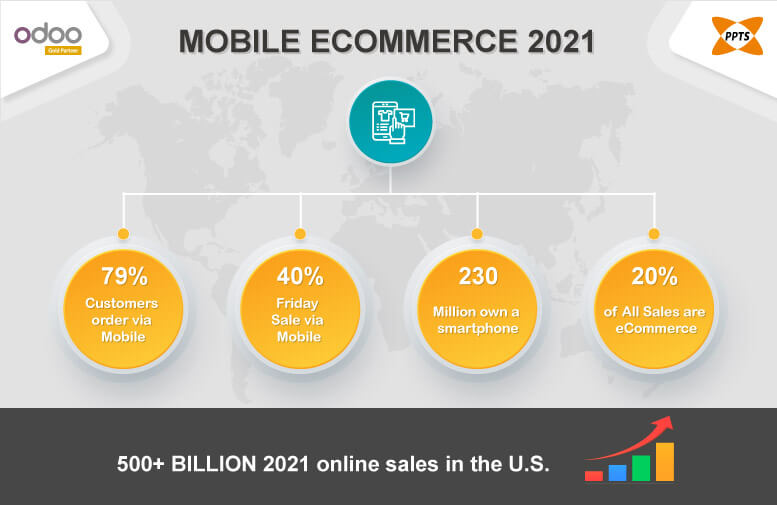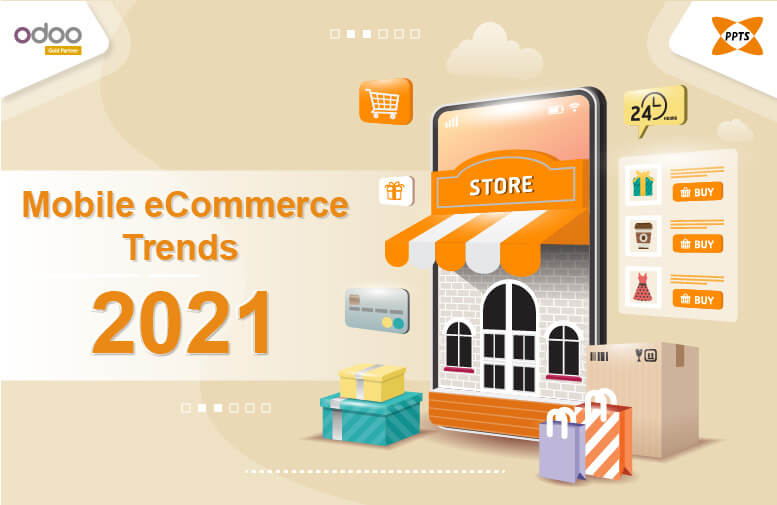The eCommerce world is bustling with rapid changes over the years and we can’t wait to see just how unpredictable 2021 is going to be!
Thanks to the pandemic and everything in between, eCommerce giants like Amazon and Flipkart have had their struggles to bring businesses back in line with the new normal. Shopping habits have shifted massively, making online purchase everyone’s priority
According to recent stats by Statistica,
“Mobile commerce is on pace to control 73% of the global eCommerce market share by 2021”
But what exactly is mobile commerce?
This word has been doing the rounds for quite a while now and surely so, it will be the buzz word for a very long time. Ever since the footfalls have dropped in retail stores and markets, online businesses have begun experiencing a stellar spike in sales and web traffic. Mobile electronic commerce has opened doors to make purchases from electronic storefronts and online services from automated services providers. The transition to a digital data directory also facilitates the need for electronic point-of-sale and personal digital assistants. This is just a glimpse into the world of mobile e-commerce and what it has to offer.
But is it all for the better? Surely, yes!
Mobile eCommerce sales are sure to account for 54% of total eCommerce sales in 2021!
But strangely these numbers are dwindling. eMarketers say that businesses could be driving at a loss in terms of their sales numbers, making it crucial to correct their error margins. With offline companies scrambling to make sense out of their devastated business plans, some of them are taking the necessary steps to combat with the sudden change, effectively.
As per DynamicYield,
“Only 12% of existing consumers find shopping on the mobile web as convenient“
That is a lot of room for improvement!
More importantly, mobile usage is undoubtedly influencing our buying decisions even when a physical brick-and-mortar store was the norm. One-third of our decisions have been influenced based on the information we look up on mobile devices and the product reviews that help us in proceeding with a purchase.
So what are the trendsetters that are to take over the markets in 2021?
These are some of the insights into predicting what could likely be a business-must in the year to come!

The trigger words that have led to altered shopping behaviour are convenience, compliance, quality and commuter-friendly.
With that, these are the technical trump-cards in the mobile e-commerce world for the upcoming year that every online business needs to incorporate.
The advancement into voice shopping
Several mainstream mobile platforms have become a big part of life these days. And with that, businesses have begun to see the need to have it too! Virtual assistants like Alexa, Ok Google, Siri and more are some among the best examples of how voice shopping has made its mark in a very sure-shot way. Companies should be taking the stats into account considering that voice-based online purchases are expected to soar up to $40 million by the year 2022!
The Integration of Mobile Chatbots
AI-driven chatbots have become a thing ever since the need for a mobile integrated platform arose and rightfully so, these chatbots can accommodate hundreds of customer queries and human interactions in one go. Their constant presence only ensures that customer complaints and concerns are addressed with promptness and precision. This is a trend that will only continue to stay even beyond the upcoming year.
The usage of AR/VR
The words “Augmented reality” and “Virtual reality” have been in the headlines for as long as we can remember and this has become all the more prominent with the occurrence of mobile commerce. Businesses are beginning to realize that these two technologies have the power to transform the computer world and shape the way we see software implications impact our device knowledge.
Effective omnichannel experiences
The sign that e-commerce brands are performing to the expected mark is through the usage of their multiple online and offline channels. According to a business review by the Harvard business journal, almost 73% of customers shop through
Some of the industries that have been booming with the usage of mobile e-commerce are:
- Mobile money transfers
- Location-based services
- Mobile marketing, coupons, and loyalty cards
- Electronic tickets and boarding pass.
- Digital content purchases and delivery.
- Mobile banking.
Businesses are slowly seeing the need to make changes to their business modules to accommodate such changes. This is however a deficit for most brick and mortar companies who have been on the back tide ever since the crisis and in terms of eCommerce development. With 2021 just around the corner, planning on profit margins for the upcoming quarter will most definitely see mobile-e-commerce come centre-square in every business plan.
-
What does eCommerce means?
It is a business model that allows firms or individuals to become buyers and sellers in order to make a purchase based over the internet.
-
What is Mobile eCommerce?
It is the use of any wireless device to conduct online or electric transactions. This includes making a purchase, point of sales and online banking etc.
-
What is the difference between eCommerce and Mobile Commerce?
E Commerce is an umbrella term that encompasses all areas and types of commerce. Whereas, mcommerce is a subcategory that focuses on making purchases via mobile devices.
-
What percentage of Online Shopping is Mobile?
79% of shoppers have shifted to making purchases from their mobile devices. The percentage has gotten higher since the pandemic and will see a major boom from this year onwards.
-
How mobile devices have had an effect on e-commerce?
The most significant impact the mobile devices have had on e-commerce is the steep rise and expansion of opportunities that are spread across all areas of the market. It has also become a powerful tool to increase sales.
-
Why is mobile commerce on the rise?
It is evident that mobile commerce has taken the path that overtakes the ecommerce industry and the graph will only see an upward tragictory here. With the rise in smartphone sales, nearly every consumer looks up an online review before heading towards purchase. This has also led to a rise in virtual footfalls towards online stores.








